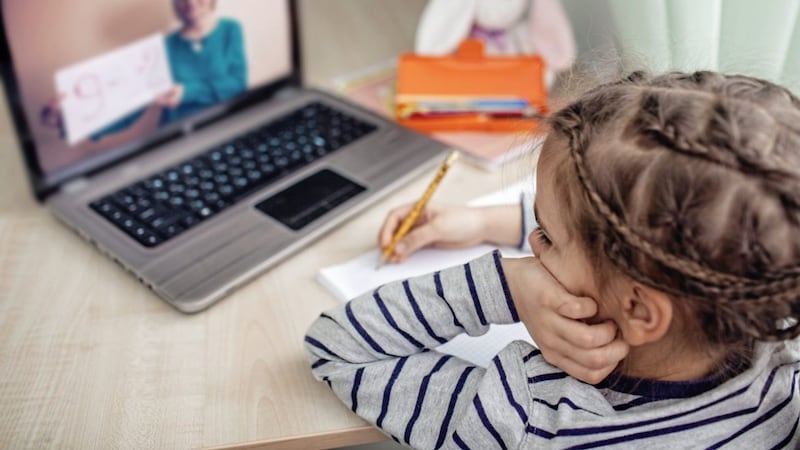PUPILS will not make similar progress to taught lessons during remote learning, the Department of Education has warned.
In guidance to schools, it advised principals to "take a pragmatic approach to delivering the curriculum, prioritising key knowledge, understanding and skills in each area of learning".
It said the lag in progress is a something which "has emerged worldwide during the current school closures".
The department is urging schools to "aim to engage with pupils on an ongoing basis through the wide range of e-learning platforms available rather than provide hard copy or emailed resources alone".
Technology can "potentially increase both the quality and quantity of remote learning" and e-learning platforms provide "additional opportunities to motivate pupils, establish a daily routine and give ongoing feedback, helping to keep pupils engaged and enhancing their learning experience".
Schools have been warned that "the success of all pupils during this period and particularly those from disadvantaged groups is linked to maintaining a close relationship with their teachers".
A department spokeswoman told The Irish News that the Education Authority (EA) has funding for "a number of learning applications and upgrading the bandwidth in specific areas", with many schools "able to lend laptops and tablet devices to children who needed them".
There is also a scheme to provide devices and WiFi access to "educationally disadvantaged and vulnerable learners", with around 11,000 digital devices delivered by the EA to assist pupils with learning at home.
Schools have "a dedicated Covid-19 link officer" and there is an EA website for resources, with Teacher Professional Learning sessions on remote learning.
The department says e-learning learning tasks should last around 10-30 minutes for primary pupils and 30-45 minutes for post-primary pupils, with teachers using "visuals, video and audio where possible".
According to a recent report by Stranmillis University College, almost a quarter of families didn't have a printer during the first round of remote learning, with schools told to "actively encourage parents to get copies of resources from school or for them to be delivered or posted".
Researchers said the most common call from parents was "for some degree of live interaction with teachers".
The department has told schools to "consider" some live lessons, saying "one lesson a day or even one or two lessons a week at a regular time can be valuable and help to develop something of a routine for pupils".
"It also keeps a level of personal interaction and belonging to the school community, as well as allowing pupils direct access to high quality teaching."
But Caroline McCarthy of teaching union INTO warned that online live lessons "are not the fix-all solution to education at home", with "better ways to deliver remote teaching".
Such lessons require "access to a computer or tablet that you’re not sharing with a sibling or parent, broadband width which doesn’t drop out because of where you live or too many users in the house".
"Teachers are reminded that they cannot be pressurised to undertake live streaming, they can say no and use alternative teaching methods which they prefer in meeting the learning needs of their pupils," she added.
The issue of personal data protection "also has to be considered".
"An argument of whether teacher unions are pro or anti live lessons distracts from the real challenges being faced in our schools.
"What must be in place for remote learning to be effective is that teachers and pupils have access to proper resources, both physical and digital, and that children can be reassured that they are not falling behind, and that schools are providing as good a service as is practicable."
The NASUWT said it is "not opposed in principle to live streaming of lessons" but also stressed "issues around privacy and safeguarding for teachers".
"Most teachers will have had no experience of teaching remotely prior to the Covid-19 pandemic and most will have received very limited training or professional development in remote education and blended learning approaches."
It also said there is "very limited evidence about effective practice in remote teaching and learning in schools".








